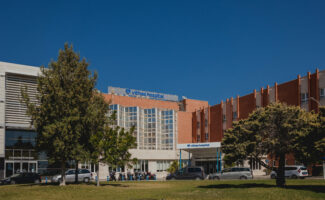What is gynaecology and obstetrics?
Gynaecology is the branch of medicine that deals with diseases of the female genital tract. We offer women all our medical experience and technical resources to provide comprehensive care.
Gynaecological needs change and evolve in line with different stages of development, from adolescence to maturity.
The Vithas Gynaecology Unit works in a comprehensive manner based on a multidisciplinary approach. We work closely with various specialities, such as coloproctology, psychology, assisted reproduction and nutrition, among others.
Which patients is it for?
Our mission is to deliver comprehensive care to women during pregnancy, childbirth and puerperium physiology, pathology related to pregnancy, childbirth and puerperium and gynaecological patients, including cancer patients.
You should see a gynaecologist if you have:
- Menstrual problems or pain
- Dysmenorrhea (severe menstrual cramps)
- Hypomenorrhea (decreased menstruation)
- Amenorrhea (no menstruation)
- Premenstrual abnormalities
- Symptoms of endometriosis
- Abnormal vaginal discharge
- Breast abnormalities: lumps, pain, or discomfort
- Perimenopause (start of menopause)
- Abnormalities in menopause
- Preeclampsia (high blood pressure in pregnant women)
- Symptoms of gestational diabetes
- Symptoms of toxoplasmosis
- Symptoms of infertility
- Symptoms of polycystic ovaries
Main conditions and diseases
- Endometriosis
- Gynaecological cancer, prevention, early detection, treatment and follow-up: cervical, endometrial, ovarian, uterus, vagina, vulva cancer
- Breast cancer: prevention and early detection, treatment and follow-up
- Climacteric and menopause
- Postpartum pelvic floor recovery
- Genital prolapse
- Cystocele
- Rectocele
- Uterine myoma
- Ovarian cysts
- Uterine prolapse
- Urine leakage
- Human Papillomaviru
- Bartholin’s cyst
- Cystitis
Areas of specialisation
- Assisted reproduction hospital unit (ARHU)
- Low instrumental delivery unit
- Breast unit
- Minimally invasive laparoscopic surgery
- Aesthetic gynaecology
- Maternal-foetal ultrasound unit
- Maternal education
Main diagnostic resources and technology
Vithas offers an extensive range of diagnostic tests to complete any gynaecological check-up:
- Ultrasound
- Breast ultrasound
- Mammogram
- Hysterosalpingography
- Hysteroscopy
- Laparoscopy
- Colposcopy
- Cytology
- Mammogram
- Chorionic biopsy
Special services
- State-of-the-art ultrasound technology, fundamental for detecting anomalies in the baby early and allowing you to see its face before it is born.
- Gynaecologists specialised in ultrasound monitoring during pregnancy, with the highest accreditations in these disciplines.
- Protocols for detecting different chromosomopathies, without undergoing invasive tests.
- Childbirth pathway, showing you first-hand how, where and with whom you will give birth.
- Breastfeeding, cardiopulmonary resuscitation and pelvic floor rehabilitation workshops.
- Delivery plan, in which your preferences and needs will be listened to.
Why go to the clinic?
Regular check-ups are vital for preventing serious diseases of the female reproductive system. We like to emphasise the need for these check-ups on a regular basis, as it is the best way to prevent developing a condition and ensure good health.
During a routine gynaecological check-up, the doctor usually follows a procedure that is tailored to each patient.
- They will ask about your general state of health, family history, menstruation, pregnancy and abortions, etc. The specialist will use this information to prescribe preventive tests.
- They will perform an internal and external examination of the genital tract.
- They will conduct preventive tests based on your age (cytology, pap smear, mammography, etc.).
- Cytology is performed from the age of 25 to detect lesions in the cervix early, which is the fourth most frequent cause of cancer in women.
- A mammogram is a preventive gynaecological test that is recommended from the age of 40 to detect alterations in breast tissue and prevent breast cancer.
- They will prescribe treatments or therapies to prevent or treat any discomfort.













